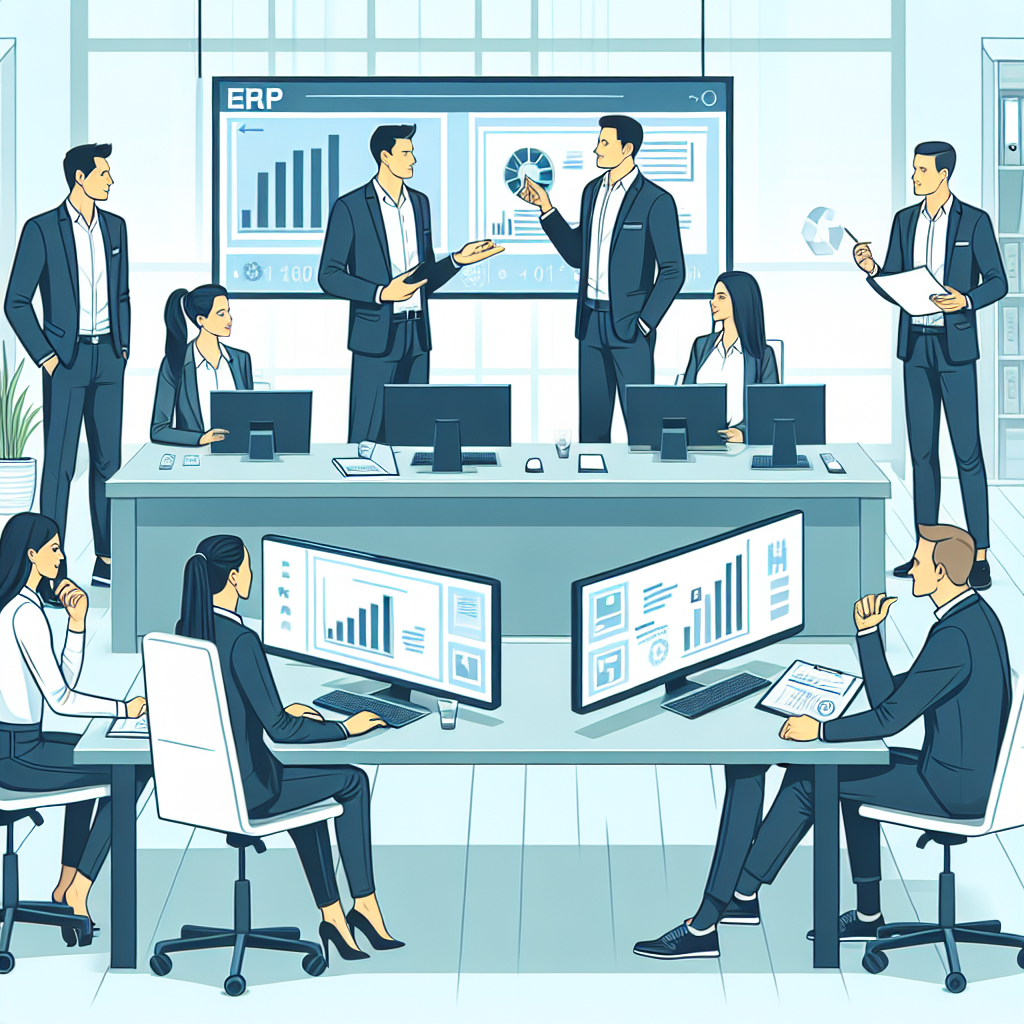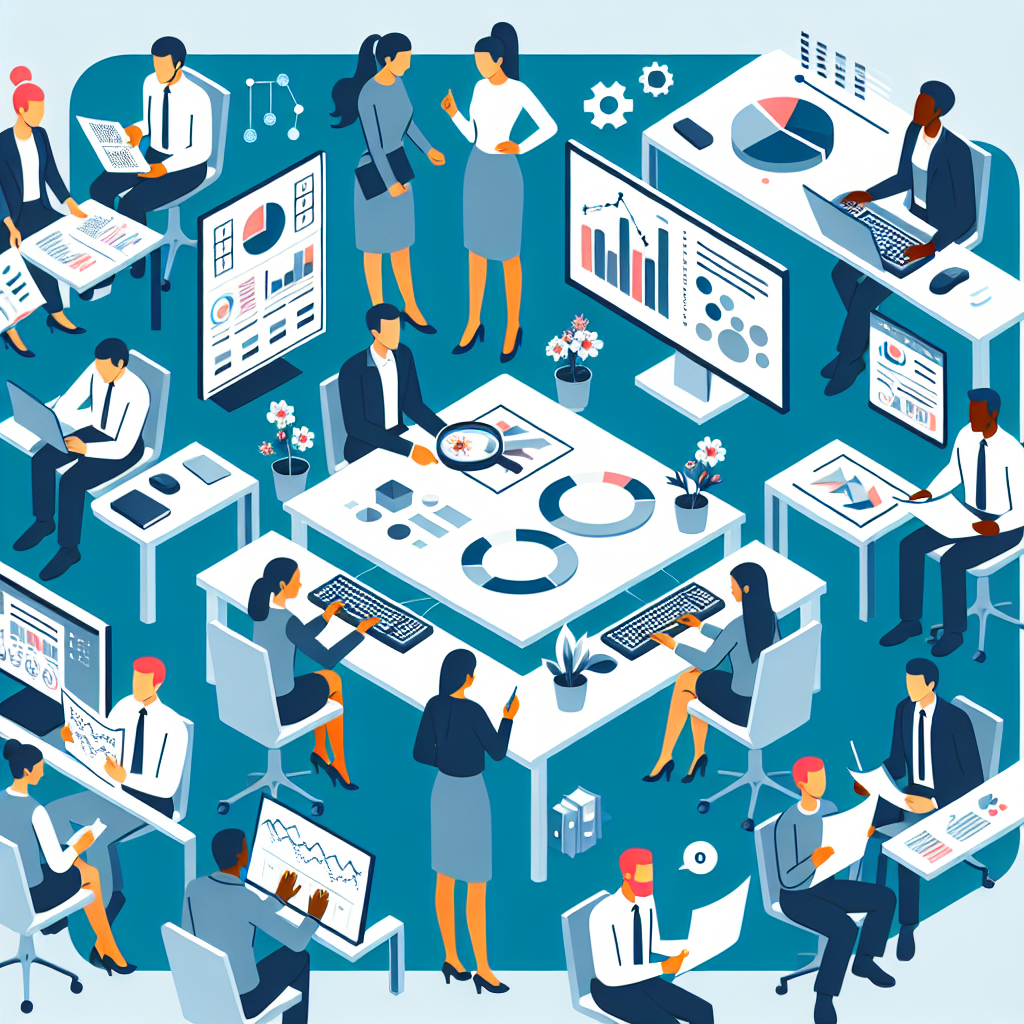Custom ERP System Development: Effective Solutions for Business Implementation and Task Resolution

What is an ERP System: Understanding Its Core Benefits for Your Business?

If you ever found yourself struggling to manage multiple business applications and separate databases, youre not alone. Many businesses face the challenge of keeping everything in sync. This is where an ERP system: what it is becomes a game-changer. ERP, or Enterprise Resource Planning, is a software solution that integrates all facets of business operations, helping streamline processes and information across the organization.
Imagine running a manufacturing company. You have production schedules, inventory levels, sales orders, and customer information scattered across different systems. An ERP system brings all this information into a single, unified platform. Trust me, this is like organizing your garage; once everything is in its place, you not only find things easier but also make faster decisions. With a comprehensive view of operations, your sales team can accurately forecast inventory needs, your production team can efficiently schedule tasks, and your finance team can keep accurate records—all in real-time!
The Core Benefits of an ERP System
- ⭐ Improved Efficiency: One of the biggest advantages of an ERP system is its ability to streamline processes. By automating repetitive tasks, such as order processing and invoicing, you can save both time and money.
- ⭐ Data-Driven Decisions: With an ERP, access to real-time data helps businesses make informed decisions promptly. Imagine being able to respond to market changes almost instantly!
- ⭐️ Enhanced Security: Keeping your data secure is no small task, especially when dealing with customer and financial information. ERP systems often come with advanced security features to protect sensitive data.
- ⭐ Cross-Department Collaboration: For companies with distinct departments, having a unified platform promotes better communication and teamwork among teams, helping everyone to stay on the same page.
- ⭐️ Customization: Depending on your industry needs, a custom ERP system development can be tailored to fit your specific requirements, ensuring you only get what you need!
What Tasks Does an ERP System Solve?
So, what exactly can an ERP system help you accomplish? Consider the following:
| Task | ERP Solution |
| Inventory Management | Automated stock level updates and reorder alerts |
| Financial Reporting | Real-time financial analytics and reporting tools |
| Customer Relationship Management | Centralized customer data for better interactions |
| Manufacturing Planning | Production scheduling and resource allocation |
| Compliance Tracking | Automated tracking of compliance requirements |
| HR Management | Automated payroll and employee data management |
| Project Management | Resource allocation and role assignments |
| Sales Forecasting | Data analytics for enhanced sales predictions |
| Order Fulfillment | Streamlined order processing from start to finish |
| Data Analysis | Advanced analytics for strategic decision-making |
Based on a report by PwC, companies that implement an ERP system experience an average productivity boost of about 25%. Imagine what that boost in efficiency could mean for your business! ⭐
Why Make the Shift?
Implementing an ERP system is not just about technology; its about transforming how your business operates. For instance, a customer of ours, a medium-sized retail business, was struggling with inefficient inventory management. Their old setup required multiple spreadsheets, and they often faced stockouts during peak seasons. After switching to an ERP system, they had real-time visibility of their inventory levels. This led to a dramatic decrease in stockouts—up to 35%—and significantly improved customer satisfaction! ⭐
“The smooth transition and training provided by Artivale were invaluable,” says the owner. “We didn’t just gain a system; we gained a partner.”
As you consider what is needed for the successful implementation of ERP, remember: adequate planning, employee training, and choosing an experienced partner are vital. That’s where we can help! At Artivale, we have over 20 years of experience helping businesses like yours seamlessly implement effective ERP solutions. Just call Alexandra at [email protected] to learn how we can tailor an ERP system for you!
Expert Recommendations
Managing an IT infrastructure can be tricky, and maintenance is key to avoiding disruptions. Our experts suggest:
- ⭐ Regular Updates: Software should be updated at least once a month to improve security and functionality.
- ⭐️ Security Checks: Ensure that firewalls and anti-virus software are reviewed regularly, as cyber threats evolve quickly.
- ⭐ Documentation: Maintain clear documentation of all processes to help new and existing employees understand the system better.
Ready to Transform Your Business?
If youre ready to take your business to the next level with an implementing ERP: effective solutions for business, reach out today! Whether you have questions or are ready to start your project, we are here with one-stop solutions designed just for you.
⭐ Dont wait! Call us at [email protected] or visit artivale.com to schedule a consultation!
Frequently Asked Questions
-
What is an ERP system?
An ERP system integrates various departments and functions into one system to streamline processes and information. -
Why should I implement an ERP system?
To improve efficiency, data accuracy, and decision-making across your organization. -
What tasks does an ERP system solve?
It addresses challenges in inventory management, financial reporting, and customer relationship management. -
How much does it cost to implement an ERP system?
Costs can vary, but typically start at €1,000 for basic solutions. -
What is needed for successful ERP implementation?
Planning, training, and choosing the right software partner. -
Can I customize my ERP system?
Yes! Custom ERP system development allows for tailoring to your specific needs. -
How long does it take to implement an ERP system?
Implementation can range from a few months to over a year based on complexity and size. -
Who will support my ERP system after implementation?
Artivale provides ongoing support to ensure you maximize your ERP investment. -
Is ERP software secure?
Yes, modern ERP systems come with robust security features. -
What industries benefit from ERP systems?
Manufacturing, retail, healthcare, and many other industries find ERP advantageous.
Why Implementing ERP: Effective Solutions for Business Growth and Efficiency?

Are you finding it difficult to keep your business operations efficient and your profitability high? If so, it might be time to consider implementing an ERP system. But why exactly should you invest in this software solution? The answer lies in understanding the myriad benefits that an ERP system can provide to your business.
Imagine this scenario: You’re running a successful retail business, but your sales process is bogged down with manual data entry, which frequently leads to mistakes. You spend countless hours updating spreadsheets and trying to reconcile discrepancies. Each time you encounter an issue, potential clients slip through the cracks because your teams aren’t aligned. What if there was a way to eliminate these hassles? An
implementing ERP: effective solutions for business could just be the answer.
The Key Reasons to Implement ERP
- ⭐ Streamlined Operations: An ERP system integrates all your business processes into one unified platform. It automates repetitive tasks, reduces errors, and essentially frees up your team’s time to focus on strategic initiatives.
- ⭐ Enhanced Reporting: With real-time data analytics at your fingertips, you can generate reports that provide insights into your operations. This is crucial for informed decision-making that drives growth.
- ⭐ Improved Collaboration: An ERP ensures that departments can communicate effectively, breaking down silos. Sales, marketing, and production working together? You can count on a smoother workflow.
- ⭐ Scalability: Your business is always evolving, and with an ERP system, you can scale as you grow. New products, additional locations, or entering different markets become easier with an adaptable system in place.
- ⭐ Cost-Effectiveness: By reducing inefficiencies and improving productivity, an ERP system can significantly lower your operational costs. Think of it as an investment that pays for itself over time.
Real-Life Examples of ERP Benefits
Let’s take a look at a real-world example. A growing e-commerce company we worked with was struggling with order processing. Their legacy system couldnt handle the volume, resulting in delayed shipments and unhappy customers. After implementing an ERP system, they observed:
- ⭐ A 40% reduction in order processing time.
- ⭐ Customer satisfaction scores increased by 30%—proving that the investment directly impacted their bottom line.
- ⭐ Inventory turnover improved significantly, allowing them to reinvest in new products much faster.
The owner stated, "Switching to an ERP system was the best decision we made! It transformed our operational efficiency and allowed us to focus on growth." Imagine achieving similar results for your business! ⭐
What Tasks Does an ERP System Solve?
Understanding the effective solutions for business growth means knowing just what challenges an ERP system can tackle:
| Challenge | ERP Solution |
| Data Management | Single source of truth for all data assets |
| Inventory Management | Real-time inventory tracking to prevent stockouts |
| Customer Relationship Management | Centralizes customer data for personalized service |
| Financial Visibility | Comprehensive financial reporting at your fingertips |
| Regulatory Compliance | Automated compliance with industry standards |
| Production Planning | Efficient scheduling and resource allocation |
| Sales Tracking | Real-time sales metrics for better forecasting |
| Human Resources | Centralized employee data management |
| Project Management | Resource optimization and timeline tracking |
| Reporting | Customizable reporting for all departments |
According to a survey by Deloitte, 92% of companies that implemented an ERP system reported improvements in their business processes. This statistic speaks volumes about the efficacy of ERP in fostering sustainable growth! ⭐
Getting Started with ERP Implementation
When considering what is needed for the successful implementation of ERP, keep these key factors in mind:
- ✅ Engage Stakeholders Early: Ensure that everyone from IT to department heads is on board with the implementation. Their insights will be invaluable.
- ✅ Plan for Training: Without proper training, even the best ERP system can fall flat. Set aside time and resources for comprehensive training sessions.
- ✅ Choose the Right Partner: Selecting an experienced provider, like Artivale, simplifies the process. We offer over 20 years of experience in tailored ERP solutions!
When you’re ready to take the leap into better efficiency and substantial growth, we’re here for you. Call Alexandra at [email protected] or visit artivale.com to get started with your ERP journey today!
Frequently Asked Questions
-
What are the key benefits of implementing ERP?
ERP systems streamline operations, improve reporting, and promote cross-department collaboration. -
How does ERP improve efficiency?
By integrating different processes and automating routine tasks, an ERP system reduces time lost to errors. -
Can ERP help with customer satisfaction?
Yes! Better order management and quick access to customer data enhance service quality. -
Is ERP scalable for growing businesses?
Absolutely! An effective ERP system grows with your business, accommodating new products and changes efficiently. -
What is needed for a successful ERP implementation?
A well-defined strategy, stakeholder buy-in, training, and an experienced implementation partner. -
What types of businesses benefit from ERP?
Businesses of all sizes can benefit, especially those that require integration across multiple functions. -
How can we measure the success of ERP implementation?
Measuring improvements in efficiency, report accuracy, and employee satisfaction can indicate the success. -
What are common challenges in ERP implementation?
Resistance to change, inadequate training, and poor data quality can hinder successful implementation. -
Can ERP systems integrate with existing software?
Yes! Most modern ERP systems are designed to merge with a variety of other software solutions. -
How long does it take to implement an ERP system?
Implementation can take anywhere from a few months to over a year, depending on the business size and system complexity.
How Much Does It Cost to Implement an ERP System, and What Are the Key Factors to Consider?

When it comes to implementing an ERP system, one of the first questions on any business owners mind is: How much will it cost? ⭐ Its a valid concern, especially for small to medium-sized businesses looking to maintain profitability while investing in new technologies. But the cost isnt as straightforward as it may seem, and there are several factors you should consider before diving in.
Breaking Down the Cost of ERP Implementation
The cost of implementing an ERP system can vary widely depending on multiple factors. Here’s a rough breakdown to give you a clearer picture:
| Cost Component | Estimated Cost (EUR) |
| Software Licenses | €5,000 - €50,000 |
| Customization | €2,000 - €20,000 |
| Training | €1,000 - €10,000 |
| Data Migration | €500 - €5,000 |
| Implementation Partner Fees | €5,000 - €30,000 |
| Ongoing Maintenance | €500 - €3,000/month |
| Total Estimated Cost | €15,000 - €120,000+ |
As you can see, the total cost of implementing an ERP system can range from around €15,000 to well over €120,000, depending on the complexity of your business needs and the ERP solution you choose. ⭐️
Key Factors to Consider When Budgeting for ERP
As you start to think about implementing an ERP system, keep these key factors in mind to better estimate your costs:
- ⭐ Type of ERP System: There are cloud-based and on-premise solutions, each with its cost dynamics. Cloud systems usually have lower upfront costs but may involve ongoing subscription fees.
- ⭐ Customization Needs: Most businesses will need some level of customization. The more tailored your system is to your specific processes, the higher the cost.
- ⭐⭐ Training Requirements: Effective training is essential for a successful ERP implementation. Be prepared to allocate budget for training sessions for your employees.
- ⭐ Integration with Existing Systems: Your ERP should work seamlessly with your current software. The complexity of integrating different systems may add to your overall costs.
- ⭐️ Security and Compliance: If your business operates in a regulated industry, additional security features may be necessary, which can increase costs.
Examples of Real-World Costs
To drive the point home, let’s look at an example. A mid-sized manufacturing company recently implemented an ERP system tailored specifically for their operations. Their estimated costs broke down as follows:
- Software Licenses: €20,000
- Customization: €15,000
- Training: €3,000
- Data Migration: €2,500
- Implementation Partner Fees: €10,000
- Ongoing Maintenance: €1,000/month
With a total initial investment of about €50,000, they were able to significantly reduce their inventory management times by 30% and improve their order accuracy rates. Their ROI over the following year justified the expense and showcased the true value of their ERP investment. ⭐
How to Justify the Cost
Investing in an ERP system is not just about upfront costs; it’s about return on investment (ROI). Consider the potential improvements in operational efficiency, customer satisfaction, and overall productivity as you make your case to stakeholders. A well-implemented ERP can lead to:
- ⭐ Increased Sales: With better data and analytics, your sales team can make informed decisions about promotions and customer outreach.
- ⭐ Time Savings: Automating repetitive tasks can free up employee time, allowing them to focus on higher-level business strategies.
- ⭐ Cost Reductions: By improving workflows and streamlining tasks, businesses can expect significant reductions in operational costs.
- ⭐ Better Compliance: Streamlined reporting and data management can simplify your compliance with industry regulations.
Ready to Dive In?
Understanding the costs and factors involved in what is the implementation of an ERP system can seem daunting. But don’t let it hold you back from enjoying the long-term benefits of improved efficiency and profitability! With our 20 years of expertise, Artivale is here to guide you through the process. We provide tailored solutions to meet your unique business needs.
If you’re ready to explore your options or have questions about the investment, contact Alexandra at [email protected] or visit artivale.com for more information!
Frequently Asked Questions
-
What are the typical costs associated with ERP implementation?
Costs can range from €15,000 to over €120,000, varying based on system complexity and business needs. -
Is custom ERP system development more expensive?
Yes, customization often increases costs but is necessary to tailor the ERP to fit your specific processes. -
How can I estimate ongoing maintenance costs?
Ongoing costs can be around €500 to €3,000 per month, depending on the service provider and level of support. -
What is the ROI timeline for an ERP investment?
Many companies see a return on their investment within 1-3 years, depending on their business model and implementation effectiveness. -
Are there hidden costs in ERP implementation?
Yes, factors like data migration, integration, and training can contribute to expenses that aren’t initially apparent. -
Can small businesses afford ERP?
Absolutely! Many ERP systems offer flexible pricing, including cloud-based solutions that reduce initial investment. -
How do I justify the cost of an ERP system to stakeholders?
Highlight potential efficiencies, cost savings, and enhancements in customer satisfaction and compliance. -
What should I look for in an ERP implementation partner?
Experience, customer reviews, and comprehensive support are essential for a successful partnership. -
What types of businesses benefit the most from ERP?
Businesses that need integration across multiple departments, handling inventory, or managing complex customer relationships find great value in ERP. -
Is cloud ERP cheaper than on-premise ERP?
Generally, cloud ERP has lower upfront costs, but ongoing subscriptions may accumulate depending on your usage.
Submit your details in the form and our team will personally get in touch with you within the next business day to discuss your needs
